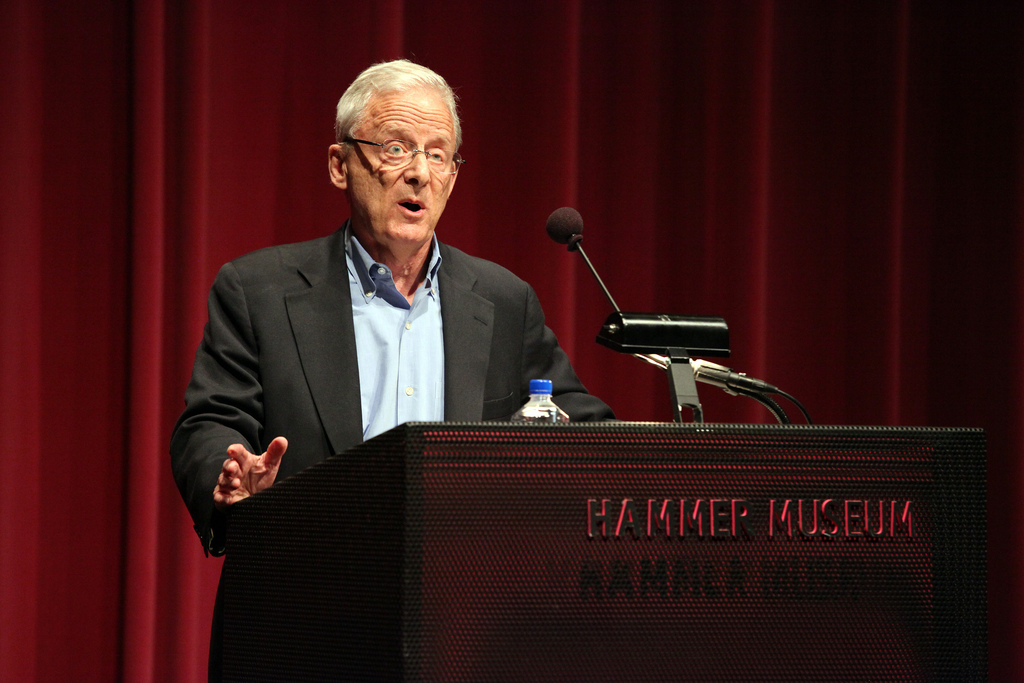
After weeks of controversy over his new book, Joseph Lelyveld joked that he may be the victim of mistaken identity.
“I am not the Joseph Lelvyeld who wrote a book about the secret sex life of Gandhi,” he said, referring to reviewers who have said his book, Great Soul, reveals the Mahatma as a bisexual. His lecture about what the book does say sold out the Billy Wilder Auditorium at the Hammer Museum.
In fact, said Lelyveld, the former executive editor of The New York Times and a Pulitzer Prize-winning author, though he does not follow many of Gandhi’s life choices – vegetarianism, nature cures and celibacy, to name a few – “I like and admire him even more at the end of this journey I imposed on myself than I did at the outset” of the book-writing project.
Learning From South Africa
 The more than two decades Mohandas Gandhi spent in South Africa, where he moved as a young lawyer, are a crucial part of any biography, Lelyveld said. Yet few people understand what his time in Africa actually meant to his life.
The more than two decades Mohandas Gandhi spent in South Africa, where he moved as a young lawyer, are a crucial part of any biography, Lelyveld said. Yet few people understand what his time in Africa actually meant to his life.
Great Soul was intended to “get beyond the notion that South African shaped him and to an understanding of how that act happened, how the preoccupations he took on in one subcontinent played out in the other,” Lelyveld said. “His remarkable self-reinvention almost required foreign soil.”
Gandhi was chosen by his family to go out into the world and make a living to support his relatives. After three years in Britain, Gandhi attempted to start a law practice in Bombay. He didn’t find much success, so when he received an offer to assist with a case in South Africa he got on a boat.
“He expected to stay a year, and his final departure took place 21 years later,” Lelyveld said.
Gandhi did work on the case, but he also felt pulled toward social movements.
“In 1913, on the eve of the World War, he was still in South Africa leading a series of strikes against the coal mines and sugar plantations,” Lelyveld said.
Returning to India, Preaching Nonviolence
 By the time Gandhi returned to his home country in 1915, he had transformed his philosophies, goals and even style of dress, Lelyveld said. He had begun wearing the loincloth and shawl that would be his uniform for the rest of his life, to be in touch with the poorest of the poor among Indians.
By the time Gandhi returned to his home country in 1915, he had transformed his philosophies, goals and even style of dress, Lelyveld said. He had begun wearing the loincloth and shawl that would be his uniform for the rest of his life, to be in touch with the poorest of the poor among Indians.
“It is our responsibility to dress [the poor] first and then dress ourselves, to feed them first and then feed ourselves,” Lelyveld quoted Gandhi as saying.
As president of the Indian National Congress, a position he assumed shortly after returning home, Gandhi took the helm of the ultimately successful movement for independence from Britain. But although his leadership has led to his deification among millions of Indians, it didn’t happen the way Gandhi imagined.
“Gandhi had to recognize that each of the values he said would be pillars of Indian freedom had been pushed aside, sometimes even trampled,” by people who were ostensible followers, he said.
Failing Nobly
But if Gandhi’s role in the Indian independence movement was not an unqualified success, more troubling was the effects, or lack there of, of his work to unite Indians of different religions during the last several months of his life. He wandered the country seeking to show that Hindus could live as minorities among Muslims and vice versa.
The Mahatma sought to “douse the flames of ethnic cleansing that would ultimately destroy Hindu and Muslim and Sikh lives by the hundreds of thousands,” Lelyveld said. The effort was temporarily successful but, ultimately lost to the tremendous forces pulling Indians of different religions apart.
“I am more moved by this noble failure than his successes,” Lelyveld said.
Gandhi also seemed to sense that South Asia would join the nuclear-equipped world, an event he dreaded.
“In 1947 he said ‘God save us from this atomic bomb mentality,’ Lelyveld said, “and that was 27 years before india exploded its first nuclear device.”
What Gandhi Means
 The question underlying any study of Gandhi’s life, Lelyveld said, is the relevance it has for the present day and the future. One major legacy Gandhi left is of anticolonial protests, a form of expression he pioneered.
The question underlying any study of Gandhi’s life, Lelyveld said, is the relevance it has for the present day and the future. One major legacy Gandhi left is of anticolonial protests, a form of expression he pioneered.
Furthermore, Lelyveld said, Gandhi’s idea of satyagraha, or nonviolent resistance, has outlived him by more than 60 years and shows no signs of waning. Lelyveld cited figures from Martin Luther King, Jr. to the protesters in Egypt, Libya and other dictator-led nations as disciples of Gandhi, whether explicitly or not.
And, of course, Gandhi changed India’s fortunes forever, though he would never recognize the nation that is now home to 17 percent of the world’s people. His fight for independence, Lelyveld said, was “a conscientious attempt not just to achieve a transfer of power but to change a society from inside out.”
“If India has a social conscience, and I believe it does, that social conscience can still be called Gandhian,” he said.
For event photos, please click here.
For full video, please click here.
*Photos by Aaron Salcido




Send A Letter To the Editors